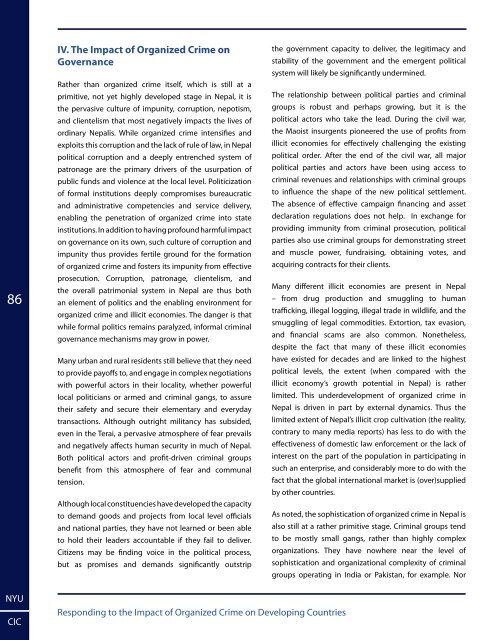here - Center on International Cooperation - New York University
here - Center on International Cooperation - New York University
here - Center on International Cooperation - New York University
You also want an ePaper? Increase the reach of your titles
YUMPU automatically turns print PDFs into web optimized ePapers that Google loves.
86<br />
IV. The Impact of Organized Crime <strong>on</strong><br />
Governance<br />
Rather than organized crime itself, which is still at a<br />
primitive, not yet highly developed stage in Nepal, it is<br />
the pervasive culture of impunity, corrupti<strong>on</strong>, nepotism,<br />
and clientelism that most negatively impacts the lives of<br />
ordinary Nepalis. While organized crime intensifies and<br />
exploits this corrupti<strong>on</strong> and the lack of rule of law, in Nepal<br />
political corrupti<strong>on</strong> and a deeply entrenched system of<br />
patr<strong>on</strong>age are the primary drivers of the usurpati<strong>on</strong> of<br />
public funds and violence at the local level. Politicizati<strong>on</strong><br />
of formal instituti<strong>on</strong>s deeply compromises bureaucratic<br />
and administrative competencies and service delivery,<br />
enabling the penetrati<strong>on</strong> of organized crime into state<br />
instituti<strong>on</strong>s. In additi<strong>on</strong> to having profound harmful impact<br />
<strong>on</strong> governance <strong>on</strong> its own, such culture of corrupti<strong>on</strong> and<br />
impunity thus provides fertile ground for the formati<strong>on</strong><br />
of organized crime and fosters its impunity from effective<br />
prosecuti<strong>on</strong>. Corrupti<strong>on</strong>, patr<strong>on</strong>age, clientelism, and<br />
the overall patrim<strong>on</strong>ial system in Nepal are thus both<br />
an element of politics and the enabling envir<strong>on</strong>ment for<br />
organized crime and illicit ec<strong>on</strong>omies. The danger is that<br />
while formal politics remains paralyzed, informal criminal<br />
governance mechanisms may grow in power.<br />
Many urban and rural residents still believe that they need<br />
to provide payoffs to, and engage in complex negotiati<strong>on</strong>s<br />
with powerful actors in their locality, whether powerful<br />
local politicians or armed and criminal gangs, to assure<br />
their safety and secure their elementary and everyday<br />
transacti<strong>on</strong>s. Although outright militancy has subsided,<br />
even in the Terai, a pervasive atmosp<str<strong>on</strong>g>here</str<strong>on</strong>g> of fear prevails<br />
and negatively affects human security in much of Nepal.<br />
Both political actors and profit-driven criminal groups<br />
benefit from this atmosp<str<strong>on</strong>g>here</str<strong>on</strong>g> of fear and communal<br />
tensi<strong>on</strong>.<br />
Although local c<strong>on</strong>stituencies have developed the capacity<br />
to demand goods and projects from local level officials<br />
and nati<strong>on</strong>al parties, they have not learned or been able<br />
to hold their leaders accountable if they fail to deliver.<br />
Citizens may be finding voice in the political process,<br />
but as promises and demands significantly outstrip<br />
the government capacity to deliver, the legitimacy and<br />
stability of the government and the emergent political<br />
system will likely be significantly undermined.<br />
The relati<strong>on</strong>ship between political parties and criminal<br />
groups is robust and perhaps growing, but it is the<br />
political actors who take the lead. During the civil war,<br />
the Maoist insurgents pi<strong>on</strong>eered the use of profits from<br />
illicit ec<strong>on</strong>omies for effectively challenging the existing<br />
political order. After the end of the civil war, all major<br />
political parties and actors have been using access to<br />
criminal revenues and relati<strong>on</strong>ships with criminal groups<br />
to influence the shape of the new political settlement.<br />
The absence of effective campaign financing and asset<br />
declarati<strong>on</strong> regulati<strong>on</strong>s does not help. In exchange for<br />
providing immunity from criminal prosecuti<strong>on</strong>, political<br />
parties also use criminal groups for dem<strong>on</strong>strating street<br />
and muscle power, fundraising, obtaining votes, and<br />
acquiring c<strong>on</strong>tracts for their clients.<br />
Many different illicit ec<strong>on</strong>omies are present in Nepal<br />
– from drug producti<strong>on</strong> and smuggling to human<br />
trafficking, illegal logging, illegal trade in wildlife, and the<br />
smuggling of legal commodities. Extorti<strong>on</strong>, tax evasi<strong>on</strong>,<br />
and financial scams are also comm<strong>on</strong>. N<strong>on</strong>etheless,<br />
despite the fact that many of these illicit ec<strong>on</strong>omies<br />
have existed for decades and are linked to the highest<br />
political levels, the extent (when compared with the<br />
illicit ec<strong>on</strong>omy’s growth potential in Nepal) is rather<br />
limited. This underdevelopment of organized crime in<br />
Nepal is driven in part by external dynamics. Thus the<br />
limited extent of Nepal’s illicit crop cultivati<strong>on</strong> (the reality,<br />
c<strong>on</strong>trary to many media reports) has less to do with the<br />
effectiveness of domestic law enforcement or the lack of<br />
interest <strong>on</strong> the part of the populati<strong>on</strong> in participating in<br />
such an enterprise, and c<strong>on</strong>siderably more to do with the<br />
fact that the global internati<strong>on</strong>al market is (over)supplied<br />
by other countries.<br />
As noted, the sophisticati<strong>on</strong> of organized crime in Nepal is<br />
also still at a rather primitive stage. Criminal groups tend<br />
to be mostly small gangs, rather than highly complex<br />
organizati<strong>on</strong>s. They have now<str<strong>on</strong>g>here</str<strong>on</strong>g> near the level of<br />
sophisticati<strong>on</strong> and organizati<strong>on</strong>al complexity of criminal<br />
groups operating in India or Pakistan, for example. Nor<br />
NYU<br />
CIC<br />
Resp<strong>on</strong>ding to the Impact of Organized Crime <strong>on</strong> Developing Countries
















